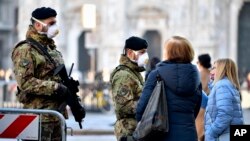The World Health Organization says the coronavirus outbreak does not yet fit the criterion for a pandemic — but warns a pandemic is possible and nations should prepare.
There are now more than 77,000 cases of the virus in China and more than 2,000 elsewhere, and the overall death toll stands at over 2,600. The sudden surge of coronavirus cases in South Korea, Iran and Italy over the past few days has created fears that what had been an epidemic is now becoming a pandemic.
WHO chief Tedros Adhanom Ghebreyesus says the virus has a potential for becoming a pandemic, but that time is not yet here.
"Our decision about whether to use the word pandemic to describe an epidemic is based on an ongoing assessment of the geographical spread of the virus, the severity of the disease it causes and the impact it has on the whole society," Tedros said.
He says this is not a pandemic, but a series of epidemics in different parts of the world, requiring a tailored response to contain the spread of the disease.
"We must focus on containment while doing everything we can to prepare for a potential pandemic," Tedros said. "There is no one-size-fits-all approach. Every country must make its own risk assessment for its own context."
The WHO chief says his agency continues to do its own risk assessment and is monitoring the evolution of the epidemic around the clock. He says there are several crucial measures countries should take to protect themselves and their people.
All countries, he says, must protect health workers, who are the front-line responders of the deadly disease. Additionally, steps must be taken to protect the elderly with underlying health conditions, who are most at risk of becoming seriously ill.
On a brighter note, Tedros says international experts investigating the origin and evolution of the disease in China found that the epidemic there peaked and plateaued between January 23 and February 2. Since then, they say cases have been declining steadily.
The experts say there has been no change in the DNA of the virus. The fatality rate in China's Wuhan province, the epicenter of the disease, is between two and four percent; outside Wuhan, it is less than one percent.




